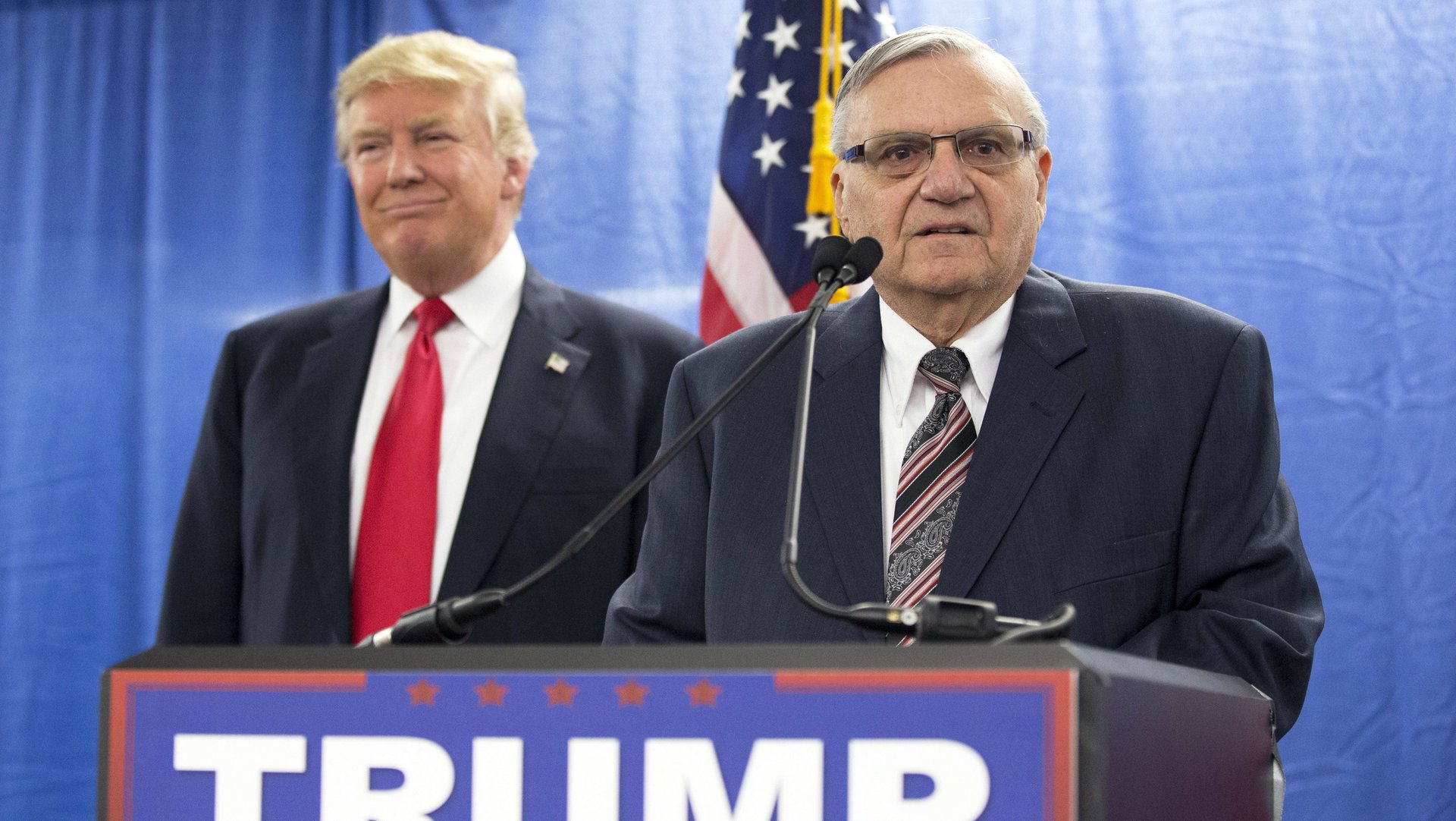Arizona’s tough-guy sheriff, Joe Arpaio, wrote the outrage playbook Trump used last night
The ability that US president Donald Trump has to blurt out shocking positions without losing the support of his base might seem like an innovation in the American political scene.


The ability that US president Donald Trump has to blurt out shocking positions without losing the support of his base might seem like an innovation in the American political scene.
But Trump’s signature style, which was in full display during his Phoenix rally last night (Aug. 22), is in many ways a rehash of the strategy developed by another man currently in the news, former Maricopa County sheriff Joe Arpaio.
Earlier this month Trump said he was considering pardoning Arpaio for violating a court order that he stop detaining suspected undocumented immigrants. Last night, the president all but confirmed that he would. “I won’t do it tonight because I don’t want to cause any controversy,” he said. “But sheriff Joe can feel good.”
A pardon would be controversial, regardless of when Trump grants it. Arpaio, who dubbed himself “America’s toughest sheriff,” is known for antics such as setting up an outdoor jail under tents in the desert heat; making inmates wear pink underwear; reviving the chain gang; and, what led to his conviction, profiling Hispanics.
Trump’s policies are somewhat tamer than Arpaio’s, but his political tactics are very similar to those that kept the sheriff in office for 25 years. Here are some examples of what Trump has borrowed from the Arizona politician.
Fanning fear of immigrants
Arpaio became a national political figure by bashing immigrants long before Trump launched his presidential bid by calling Mexicans “rapists.” He warned of the dangerous diseases he claimed immigrants were bringing to the US. He called for the US to send troops south of the border to contain crime several years before Trump, and like him, he complained about the unfairness of illegal immigration and vowed to stop it.
A passage from a 2012 Rolling Stone profile of Arpaio could very well apply to Trump five years later. He
“…doesn’t care about the complicated realities of immigration. For him, the equation is simple: Fear equals votes.”
Trump’s proposed wall is a prime example of his simplistic approach. During the rally, the president again vowed to build it, even if he has to force a government shutdown to convince lawmakers to hand over funding for it.
The hardline attitude worked for both men. Trump won the White House; Arpaio was reelected three times.
Showmen
Like Trump, Arpaio craved media attention—and became an expert at attracting it through outrageous behavior, including open defiance of federal laws. He was known for boasting about the many pages and much airtime that news outlets devoted to him, and told Rolling Stone that controversy “hasn’t hurt me in 50 years.” His pursuit of the limelight was too much even for some of his associates. “The narcissistic part of him, and the hey-everybody-look-at-me thing, is just sickening sometimes,” one of them told the magazine.
Trump seems to be of the same school of thought. “One thing I’ve learned about the press is that they’re always hungry for a good story, and the more sensational the better,” he wrote in his bestseller “The Art of the Deal.” “If you are a little different, a little outrageous, or if you do things that are bold or controversial, the press is going to write about you.”
And even while he loves to lash out at the media, as he did for a considerable part of his Aug. 22 rally, he’s admitted in the past that he’ll take all the attention he can get, even if it’s negative. Below, his tweet in response to stories about a speech his wife Melania plagiarized from Michelle Obama.
Both Trump and Arpaio have ridden that kind of bad press to notoriety, which in turn has helped them earn more support to further their agendas.
Last word
Another mantra both men seem to share is to never back down, especially when under attack. It’s a situation that Arpaio has found himself in often, given his unorthodox law-enforcement methods. His office was the subject of thousands of lawsuits. His attitude remained combative and unrepentant throughout.
Similarly, Trump hates to make concessions when he’s criticized. His doubling-down on his divisive comments in the aftermath of the clashes in Charlottesville is the latest example. He spent a good part of yesterday’s speech refuting yet again the charge that he had been ambivalent about condemning neo-Nazis, but he failed to mention that he initially blamed “many sides” for the violence in Charlottesville. He then stood and grinned as the crowd started chanting “USA! USA!”
“I’m the law”attitude
Another aspect of the “law and order persona” Trump likes to cultivate involves, somewhat ironically, bending the law. Whether Trump doesn’t fully understand legal conventions or disregards them, he’s made it clear he has no qualms about using his authority to punish political rivals. During a presidential debate, he said he would prosecute and jail his opponent, Democratic candidate Hillary Clinton.
That was a threat. Arpaio did investigate and arrest his critics, even if ultimately the cases he had against them fell apart.
Arpaio’s fate
But controversy—and the law—eventually caught up to Arpaio. He lost reelection in 2016 as Latinos registered to vote in larger numbers and Republicans grew weary of his office’s rising legal costs. The new sheriff shut down his tent city earlier this year. A few months later, Arpaio was found guilty of criminal contempt. He now faces the prospect of becoming an inmate himself.
Trump has the power to prevent that by pardoning Arpaio, whose star could rise once more. Then again, the same attitudes that ended Arpaio’s political career could eventually sink Trump’s.
Correction (Aug. 25): An earlier version of this story said attendees to Trump’s Phoenix rally chanted the Nazi slogan “blood and soil” at the event. That was a mishearing. They were chanting “USA! USA!”